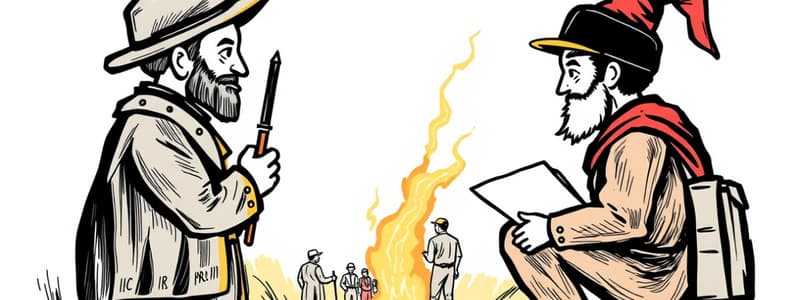Podcast
Questions and Answers
What does the term 'historical context' primarily refer to?
What does the term 'historical context' primarily refer to?
- The social, political, economic, and cultural conditions at the time a source was produced. (correct)
- The timeline of events leading to the creation of a historical source.
- The emotional impact of historical events on individuals.
- A chronological account of significant historical milestones.
Which aspect is NOT included in the criteria for analyzing sources?
Which aspect is NOT included in the criteria for analyzing sources?
- Currency
- Objectivity
- Authority
- Accessibility (correct)
How does contextualizing a source help historians avoid presentism?
How does contextualizing a source help historians avoid presentism?
- By interpreting past events through contemporary beliefs.
- By comparing historical events with modern issues.
- By disregarding current perspectives entirely.
- By placing events and texts within their specific historical timeframe. (correct)
What genre does Pigafetta's travelogue represent?
What genre does Pigafetta's travelogue represent?
Which condition most likely influenced the content of Pigafetta's travelogue?
Which condition most likely influenced the content of Pigafetta's travelogue?
What is the significance of Pigafetta’s account in the context of early European-Filipino interactions?
What is the significance of Pigafetta’s account in the context of early European-Filipino interactions?
Which of the following factors does NOT affect the timing of a historical source’s production?
Which of the following factors does NOT affect the timing of a historical source’s production?
Which of these criteria would likely help determine the 'authority' of a source?
Which of these criteria would likely help determine the 'authority' of a source?
What distinguishes historians from non-historians in their approach to historical events?
What distinguishes historians from non-historians in their approach to historical events?
Which of the following best describes primary sources in historical research?
Which of the following best describes primary sources in historical research?
What is the primary purpose of historical criticism?
What is the primary purpose of historical criticism?
Which statement illustrates a misconception held by non-historians?
Which statement illustrates a misconception held by non-historians?
What does internal criticism evaluate in historical sources?
What does internal criticism evaluate in historical sources?
What aspect of history does its etymology relate to most closely?
What aspect of history does its etymology relate to most closely?
To effectively evaluate sources, what is crucial for both primary and secondary sources?
To effectively evaluate sources, what is crucial for both primary and secondary sources?
What key skill does studying history enhance, according to its importance?
What key skill does studying history enhance, according to its importance?
Flashcards are hidden until you start studying
Study Notes
Understanding History
- History studies past events, analyzing changes over time and their effects on society.
- Historians utilize critical thinking and diverse sources; non-historians often romanticize or simplify history.
- The Greek term "historia" translates to "inquiry" or "knowledge gained through investigation."
- Historians construct narratives and debate varying interpretations for deeper insights into the past.
- Understanding history fosters a grasp of human societies, moral reasoning, and civic responsibility.
- Skills developed include evidence evaluation, critical thinking, and appreciation for diverse perspectives.
Historical Sources
- Primary sources include firsthand evidence like letters, documents, and artifacts, offering direct insights but requiring authenticity checks.
- Secondary sources interpret primary ones, like scholarly articles and textbooks, but depend on the accuracy of the originals.
- Evaluating sources involves assessing authenticity and reliability for primary, and accuracy and credibility for secondary sources.
Historical Criticism
- A method to appraise historical sources’ reliability and authenticity.
- External criticism verifies a source’s physical attributes and production authenticity, ensuring textual integrity.
- Internal criticism evaluates content truthfulness by examining context and the author’s perspective to analyze meaning and reliability.
- Criteria for analysis: accuracy (correctness), authority (credentials), objectivity (bias), currency (relevance), and coverage (accessibility).
Historical Context
- Refers to the conditions surrounding a source's production, including social, political, economic, and cultural factors.
- Contextualizing avoids presentism and enriches understanding by situating events and texts within their specific timeframes.
- Important elements: identify the producer's background, genre of the source, timing of its creation, and influences affecting its content.
Pigafetta’s Travelogue
- Antonio Pigafetta’s travelogue from 1535 offers insights into pre-colonial Philippines and European perspectives during the Age of Exploration.
- Recognized as a key primary source for early European-Filipino interactions and details of Magellan’s expedition.
- Highlights European motives of exploration, wealth acquisition, and territorial expansion under "Gold, Glory, and God."
- The travelogue genre reflects Pigafetta’s personal observations and inherent biases framed by the era's context.
- Its publication aligns with Spain's imperial aspirations and missionary objectives of the Catholic Church, shaping narrative portrayal.
Studying That Suits You
Use AI to generate personalized quizzes and flashcards to suit your learning preferences.



